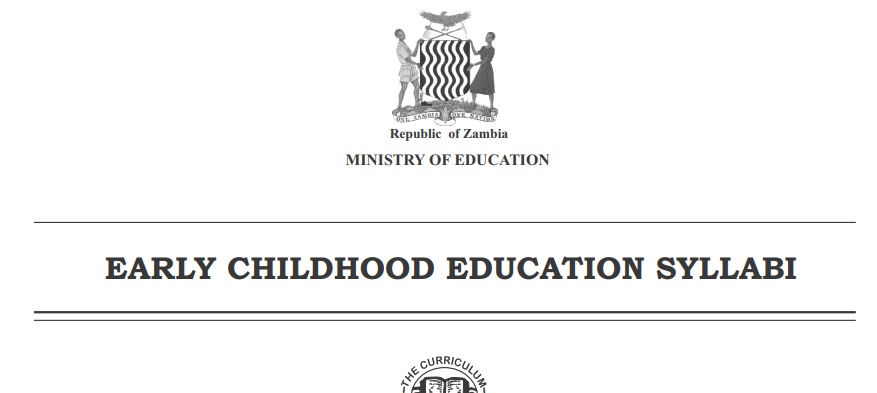Early Childhood Education (ECE) is widely recognized as a key driver of equity, social justice, inclusive economic growth, and sustainable development.
In Zambia, ECE is designed to prepare children for school and lifelong learning, playing a vital role in giving children a strong start in life by offering essential opportunities for early learning and development that contribute to later educational success.
As the United Nations Educational, Scientific and Cultural Organization (UNESCO) emphasizes, “ECE must encompass all actions that contribute to the survival, growth, development, and learning of children.” This includes attention to health, nutrition, and hygiene, alongside cognitive, social, emotional, and physical development of children from birth until they begin primary education.
The Zambian government has set an ambitious target: by 2025, 60% of Grade 1 entrants should have ECE experience, up from 42% in 2024. This goal reflects significant progress in expanding access to ECE and strengthening foundational learning. However, despite these efforts, access remains limited, and the quality of education is often low—particularly for children from vulnerable and marginalized communities.
Persistent challenges
The sector continues to face challenges, including inadequate funding and a critical shortage of trained ECE teachers. According to a recent study conducted by the Roger Federer Foundation, in collaboration with Reformed Open Community Schools (ROCS) and Zambia Open Community Schools (ZOCS), Zambia requires about K10 billion in funding to address the shortage of qualified ECE teachers.
In the 2025 national budget, the government allocated K31.5 billion to the education sector—representing 14.5% of the overall national budget, down from 15.4% in 2024, representing 9% decline. This is below the Education 2030 Framework for Action, which calls on governments to allocate at least 15% to 20% of public expenditure to education.
However, according to UNICEF, the ECE budget alone has grown by over 30%, re-emphasizing the government’s commitment to improving the sector and enhancing learning outcomes for early learners.
“While the share of ECE funding remains small, Government has progressively increased allocations to ECE. The Government’s commitment to continuous development of ECE is reflected in the 2025 budget, which has increased to K702.5 million from K528 million in 2024, representing growth of 33%,” UNICEF noted in its recent report.
Stakeholder Advocacy
Education stakeholders such as the Zambia National Education Coalition (ZANEC) continue to advocate for inclusive early childhood education. ZANEC’s goals include increasing access to ECE, improving its quality, and ensuring that all children—regardless of gender, ability, or background—have the right to education. The organization also pushes for the development of ECE policies, legislation, and systems, and coordinates with other education actors to raise awareness about the importance of education.
The organization expects Early Childhood Education to be given the necessary support and attention with qualified teachers and caregivers, to help children shape the destiny of the country.
Speaking in an exclusive interview with Money News, ZANEC Board Chairperson, Henry Kabwe, stressed the need for nationwide coordination to ensure equal access to ECE services.
One of the organization’s concerns has been that in some areas, there is more interest and attraction in terms of the provision of ECE, while the situation is different in others.
Mr. Kabwe emphasized the importance of creating a system where there is coordination and similar projects happening across the country in order to achieve 100 percent access to Early Childhood Education, as is the case in Choma district, Southern Province, where the district is almost achieving 100 percent.
“Early Childhood Education is the foundation, it is not a luxury to send a child to pre-school, nursery, or whatever name you may call it. It’s the foundation of every human being’s development. Unfortunately, over the years, we never paid attention to this sector. It’s like you are building a structure, and you pay attention to the upper part of the structure and not the foundation itself.”
“So, we can take lessons from Choma, where they are almost achieving 100 percent because they have made it a requirement for every child to go through Early
Childhood Education before getting into Grade One. We need to create a system where there is a semblance of coordination and similar projects happening across the nation so that we can achieve 100 percent access to ECE,” Mr. Kabwe stated.
He also appreciated government efforts in making ECE a part of the revised national curriculum.
Gaps in Infrastructure and Teacher Motivation
National Action for Quality Education in Zambia (NAQEZ) Executive Director, Dr. Aaron Chansa, noted that ECE performance in Zambia remains below average due to persistent challenges, such as inadequate trained teachers, funding gaps and lack of proper infrastructure.
“When you talk about ECE, we have not been doing well. We started around 2012 to implement ECE, and so far, out of about 10, 000 Primary Schools, we only have below 6, 000 Centers. This means that half of the primary schools are without these Centers and these are very important. Last year, Government was only constructing about 20 centers, now if we are going to be constructing about 20 centers, when are we going to build more than 4, 000 primary schools? It is going to be a very big task,” Dr. Chansa noted.
He also observed that many ECE teachers are not adequately trained, and those who are trained often face demotivation due to misaligned salary scales.
“They have diplomas but they have been put in salary scales for certificate holders which is demotivating a lot of teachers in this sub-sectror. Most of the ECE teachers are not promoted, I have never seen an ECE teacher who has been promoted, from HQ to provisional and district level we do not have officers to manage ECE at district level so that is also a challenge, material are a challenge.”
“Once we have enough resources, we can begin to motivate our teachers, buy appropriate desks or chairs, and also employ assistant teachers. The standard is that each class must have two teachers just to make sure that class management is maintained. As things stand, that is not the case and that dilutes the quality of education in ECE,” he added.
Constituency-Level Support Needed
Itezhi-Tezhi Member of Parliament is calling on fellow Parliamentarians and other officers who make decisions at the Constituency Development Fund (CDF) level to prioritize ECE infrastructure by constructing more centers.
Twaambo Mutinta told Money News News in an interview that the country has not taken the ECE seriously and this will continue to affect the development of children as they progress to primary education and other formal educational levels.
“As a Constituency and the country as a whole, I might says we have not done a lot of investment in terms of Early Childhood Education. I know government has invested a colossal sum of money now to build ECE Centers for the first time, which is commendable.”
“However, as stakeholders particularly the Ward Development Committees, Members of Parliament, and all the other people that make decisions at CDF level have not given attention to Early Childhood Education. If you check around CDF, there are very few Constituencies out of the 156 that have prioritized the construction of ECE Centers,” Mr. Mutinta noted.
He expressed gratitude that Itezhi-Tezhi would benefit from government plans to construct 15 ECE centers in Southern Province.
“Southern Province is privileged this year 2025, Government is going to construct about 15 ECE Centers and Itezhi-Tezhi is one of the Constituencies that will benefit and we thank Government for that,” he stated.
Parental observation
Lucky Chama, a parent, observed that most teachers, who are in the ECE centers do not possess the right qualifications, a move that has affected the delivery of quality education especially in rural areas.
“Cultural stigma around disability and to some extent government has not done much in implementing the ECE policy. To improve inclusiveness, government must expand community-based ECE centers and ensure they meet accessibility standards and see to it that there is more investment in teacher training, particularly in special needs and inclusive teacher education, is vital,” Mr. Chama urged.
“Also for parents to understand the issue at hand, there is need for community sensitization to reduce stigma and encourage parents to enrol all children early.”
Government Commitments and ZEEL Project
To improve the quality of ECE, the Ministry of Education is constructing 169 ECE Centres in 45 selected districts, funded by a US$39 million grant from the World Bank under the Global Partnership for Education. These centers will include 110 ECE hubs, each with three satellite centers, under the Zambia Enhancing Early Learning (ZEEL) project. The program has so far seen 52 schools currently under construction in phase one.
Education Minister Douglas Syakalima recently informed Parliament that funding for ECE infrastructure has significantly increased—from K155 million in 2023 to K190 million in 2024, and further to K233 million in 2025.
According to the Minister, this represents a 50 percent increase from 2023 to 2024, followed by a 23 percent growth in 2025, underscoring the government’s resolve to provide a strong educational foundation for young learners.
“As part of this commitment, the Ministry of Education is spearheading the construction of 169 Early Childhood Education hub centers across the country. Of these, 56 are funded by the Government, 3 by European Union (EU), and 110 under the Zambia Enhancing Early Learning project.”
“Education remains the foundation of our nation’s progress, and the government is steadfast in its commitment to strengthening education infrastructure and ensuring quality learning for all. The 2023 to 2025 budget allocations for the Ministry of Education reflect this dedication, with a strategic focus on Early Childhood Education (ECE) and Secondary Infrastructure Development,” Mr. Syakalima explained.
While Zambia has made commendable progress in expanding Early Childhood Education, significant challenges remain. Increased investment, equitable distribution of resources, improved infrastructure, teacher training, and greater coordination at national and local levels are critical to achieving universal access to ECE.
Ensuring that every child has access to quality early education is not just a matter of policy—it is a fundamental step toward building a just, inclusive, and prosperous society. To improve learning outcomes for all children, there is urgent need for increased funding for ECE and the education sector as a whole.



